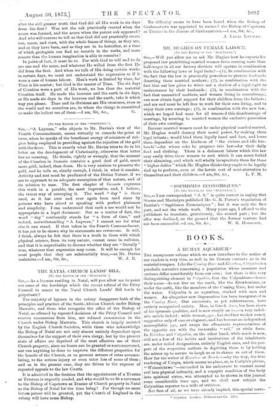THE NATAL CHURCH LANDS' BILL.
[TO THE EDITOR OF THE "SPECTATOR.")
Stit,—As a layman residing in Natal, will you allow me to point out some of the hardships which the recent refusal of the Privy Council to assent to the Natal Church Lands' Bill tends to perpetuate?
The majority of laymen in the colony disapprove both of the principles and practice of the South-African Church under Bishop Macrorie, and those who recognise the office of the Bishop of Natal, as affirmed by repeated decisions of the Privy Council and receive communion from him, are refused communion in the Church under Bishop Macrorie. This church is largely assisted by the English Church Societies, while those who acknowledge the Bishop of Natal are not only almost entirely dependent upon themselves for the support of their own clergy, but by the present state of affairs are deprived of the most effective use of their Church property, since no leases can be granted or rents recovered, nor can anything be done to improve the different properties for the benefit of the Church, or to prevent arrears of rates accumu- lating, to the serious injury or even utter loss of some of them ; and as in the present case, they are driven to the expense of repeated appeals to the law Courts.
It is admitted in the decision that the appointment of a Trustee or Trustees is urgently needed, and who would be so fit a successor to the Bishop of Capetown as Trustee of Church property in Natal as the Bishop of Natal for the time being? For though no more letters patent will be granted, yet the Church of England in the colony will have some Bishop.
No difficulty seems to have been found when the Bishop of 1 Grahamstown was appointed to succeed the Bishop of Capetown as Trustee in the diocese of Grahamstown.—I am, Sir, &c., A NATAL LAYMAX.






























 Previous page
Previous page